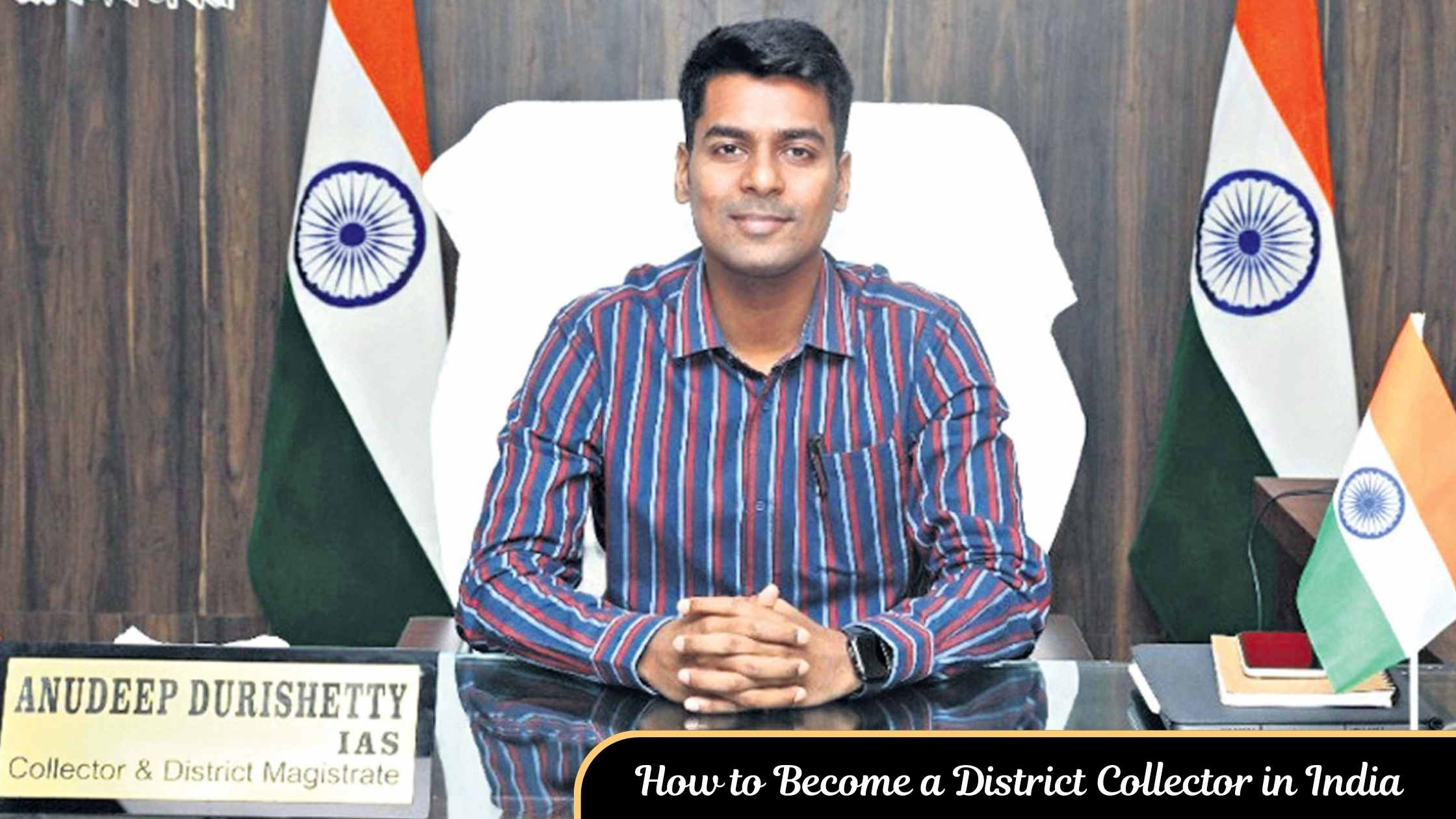Many people in India dream of becoming a District Collector, also known as a District Magistrate. This job is highly respected and important for running a district smoothly. A District Collector has many duties, like enforcing government rules and keeping peace. But getting this job takes work. It needs hard work, determination, and meeting specific requirements. Before we move into the blog, we want to clarify that becoming a District Collector Directly is not easy. But there is a proper path that you can follow to reach your destination. In this blog, we’ll explain the steps you need to follow and what qualifications you need to become a District Collector in India.
Table of Content
Step-by-Step Process to Become District Collector in India:
Becoming a District Collector in India is a dream for many. It’s a position with lots of responsibility, like making sure the government’s rules are followed and keeping peace in the area. But how do you get there. Here’s a simple step-by-step guide:
- Education: Start by finishing your studies with a bachelor’s degree from a recognized university. This gives you a good foundation for the job.
- Civil Services Exam: Next, you must pass the Civil Services Examination. It’s a tough test run by the Union Public Service Commission (UPSC). This Exam has three parts: Preliminary, Main, and Interview.
- Choose IAS: When you apply for the Civil Services Exam, pick Indian Administrative Service (IAS) as your preferred choice. Most District Collectors come from this service.
- Pass the Exams: Clear each stage of the Exam: Prelims Examination, Mains Examination and the Interview etc.

Prelims test your general knowledge, Mains dive deeper into your understanding, and the Interview checks your personality and suitability for the job. After passing all the exams, you’ll start as an Assistant Collector. With hard work and dedication, you can eventually become a District Collector. Now, let’s look at the complete details about the eligibility criteria that one needs to have to apply for the UPSC Examination to become a District Magistrate in India.
How to Become Collector After Completing 12th
Required Eligibility Criteria to Apply for District Collector Position:
It is clear now that you must appear for the UPSC Examination to become a DM in India. So, here are the criteria that one needs to have to apply for the Exam. These criteria serve as the foundation upon which your aspirations can be built. Here’s what you need to know:
- Indian Citizenship: You must be a citizen of India to apply for the position.
- Bachelor’s Degree: A degree in any Stream from a recognized university is mandatory.
- Age Criteria: There’s an age limit set by the Union Public Service Commission (UPSC) for candidates appearing in the Civil Services Examination. To become a Collector, you must be at least 21. The maximum age allowed for:
- General candidates are 32 years old,
- OBC candidates it’s 35 years
- SC/ST candidates, it’s 37 years.
- Physical Fitness: Candidates should meet the physical fitness standards the UPSC sets. There is nothing much in the physical fitness test. All you need is to stay fit and healthy.
These eligibility criteria ensure that individuals aspiring to become District Collectors possess the qualifications and capabilities for effective administration and governance. If you are young, provide you graduate and then opt to apply for the UPSC Exam.
What is the Difference Between IAS and IPS
UPSC Exam Details to become Collector in India:
This Exam is mandatory to clear to become a District Magistrate in India. Here are the details about the examination and the stages you must clear under the UPSC Exam. A candidates need to remove the Civil Services Examination (CSE). The CSE consists of three phases:
- Preliminary Examination (Objective Type): This is the first stage, comprising two papers – General Studies and Civil Services Aptitude Test (CSAT). Candidates who qualify move on to the next stage.
- Main Examination (Descriptive Type): Those who clear the Prelims appear for the Main Exam, which consists of nine papers, including essay writing, general studies, and optional subjects. Successful candidates are then eligible for the final stage.
- Personality Test (Interview): The final stage involves a personal interview to assess the candidate’s personality, communication skills, and overall suitability for administrative roles.
Candidates are required to choose an optional subject and prepare thoroughly for all stages. Success in the UPSC CSE opens doors to various prestigious positions, including the coveted role of a Collector in the Indian Administrative Service (IAS).
Role and Responsibilities of District Collector/Magistrate:
The District Collector, also known as the District Magistrate, plays a pivotal role in the administration of a district in India. Serving as the topmost government official at the district level, the Collector holds diverse responsibilities:
- Running Government Offices: Making sure that government offices work well and that rules and plans are followed.
- Keeping Peace: Making sure the public is safe and working with the police to prevent problems.
- Managing Finances: Looking after financial matters like collecting taxes and helping people during disasters.
- Organizing Elections: Making sure that elections in the district are fair and smooth.
- Helping Development: Starting projects to help the district grow and improve people’s lives.
- Dealing with Legal Issues: Acting as the head of the local court, handling legal problems, and ensuring justice is done.
In short, the District Collector/Magistrate does many things to help the government work well and make life better for everyone in the district. DM is the key link between the government and the local community, working towards the overall progress and welfare of the district.
Pay Scale and Perks of District Collector
District Collectors in India receive a competitive pay scale, typically in line with senior administrative positions between 5.2 lakhs per annum and 14.2 lakhs per annum. Alongside salary, they enjoy various perks, including:
- Basic Salary: Attractive base salary as per government norms.
- Dearness Allowance: Additional allowance to offset the impact of inflation.
- Accommodation: Government-provided or subsidized housing.
- Transportation: Official vehicles for official duties.
- Medical Benefits: Comprehensive health coverage.
- Pension: Retirement benefits and pensions.
To become a District Collector, aspiring candidates need to qualify for the Civil Services Examination conducted by the UPSC. Dedication, preparation, and commitment are essential for success in this challenging yet rewarding administrative role.
Frequently Asked Questions
To become a District Collector, you need to clear the Civil Services Examination conducted by UPSC.
The age limit varies depending on the category. Generally, it ranges from 21 to 32 years for general category candidates.
No, a bachelor’s degree from a recognized university is a mandatory requirement to apply for the position.
The journey to becoming a District Collector typically takes at least 1.5 years, including education, exam preparation, and gaining experience in the civil services.





